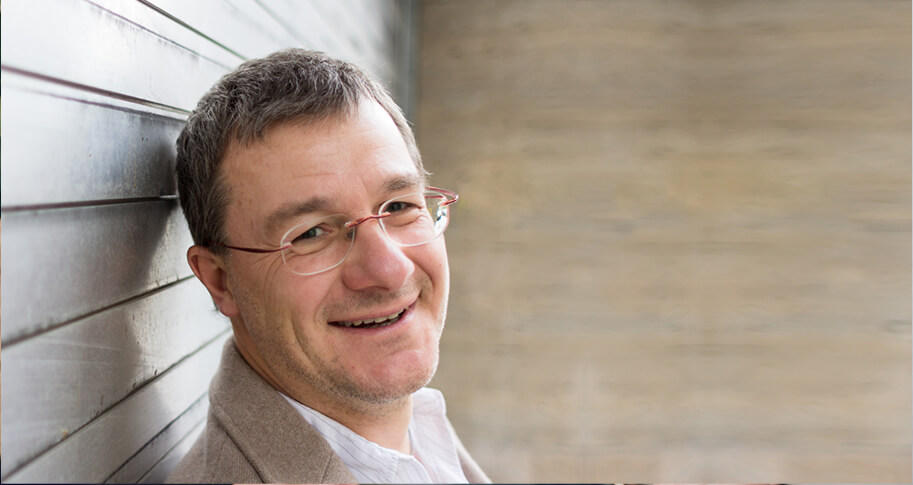Real change comes from within.

Many people have some idea of what sustainable living means but, in reality, do not actually put it into practice. Why? Journalist, coach and gestalt therapist Franz Grieser has been looking for the reason in people’s inner attitudes and has developed ideas for how people can change things step by step. In his book “Meine Reise nach Utopia” (My Journey to Utopia), he describes how conscious and sustainable living can succeed and really does not have to remain a utopian dream.
Mr. Grieser, how did environmental protection and sustainability become part of your focus? Was it prompted by some personal experience?
I cannot recall any particular experience. But in my youth in the late 1970s and early 1980s, I witnessed the anti-nuclear-power movement. I found – and still find – the so-called peaceful use of nuclear power irresponsible, not least due to the issues surrounding permanent disposal. We are leaving future generations with nuclear waste that will be highly toxic for millennia to come.
We are experiencing similar protests again today…
The climate movement is an example of how people can make something happen if they get others enthusiastic about their ideas. Compulsion and prohibition do not bring about real, sustainable change. I am convinced that real change comes only from within.
You mean, people need to start with themselves? Did that inspire you to write “Meine Reise nach Utopia?”
I have written for the online magazine utopia.de for many years. The editorial staff there came up with the idea of writing a book on the topic of sustainable living. I found the idea very exciting but, to me, an important element was missing.
Please explain.
For me, sustainable living means, on the one hand, treating the world in which we live responsibly and with care. On the other, it means being responsible and taking care when it comes to our own well-being. It means taking care of ourselves and our needs and reconciling that with the needs of our environment. For me, you cannot have one without the other.
How did your training as a coach and a therapist give you inspiration?
I have been dealing with the topic of personal development for around 20 years. When I heard about the book project, it was completely logical for me that the two topics of sustainable living and personal development are closely linked.
You write that with the book, you wanted to show readers how they can make their lives richer, more colorful and more joyful by making changes. But to most people, change and sacrifice do not necessarily have anything to do with joy. How does it all fit together?
There are two aspects to that question: change and sacrifice.
People need stability because it gives them certainty. Every change therefore involves anxiety to begin with. That is why one of the two areas on which the book focuses is personal development. The inspiration for development is intended to provide motivation as well as the necessary energy and confidence to pursue sustainable living in this way.
The second thing you mentioned is sacrifice. It is a misconception that sustainable living inevitably means making sacrifices. Yes, of course sustainable living also results in less consumption. But it is primarily less consumption of things that we do not really need.
In fact, sustainable living does not have to be depressing, dull and joyless. With my book, I want to show how colorful, joyful and exciting a conscious approach to nutrition, health and everyday life can be.
Can you describe that in more detail?
What I mean to say is that consuming less does not have to mean making any sacrifice at all, but can actually bring benefits. What do I need a tenth pair of shoes for? Somewhere along the line, many people reach the point where they realize that consuming more does not make you happier. Then you have to ask yourself: What is the source of the inner hunger that needs to be satisfied in this way? Where does that inner longing come from? What exactly is it that is missing? You need to come to this realization before any change is possible. My book is intended to help with this as a practical guide.

Could your book be described as a sort of checklist for a clean conscience?
No, it is not a checklist, nor is it about a clean or guilty conscience. It is not about checking items off: “I need to do this and this so that I can have a clean conscience.” For us, the book is not about guilt and shame versus a clean conscience. Everything that we put forward in the book is meant to increase quality of life; it should be enjoyable. It shouldn’t involve a wagging finger or a moral cudgel.
Your book also talks about microadventures. Which personal microadventures have you experienced?
That can be many things. Sometimes I go out at night when the sky is clear and look at the starry sky for a minute or two. That brings joy to my heart. But it could also be a moonwalk. Some time ago, we conducted our own guided tour of our home city with some friends. Each person in the group had prepared something for it. It was a great experience.
Which of your suggestions do you put into practice yourself?
Actually, a few now. The energy-saving tips, the mindfulness exercises and the digital break, for example. I often cycle instead of taking the car. In addition, I make a point of buying local produce and buying meat from the organic butcher so that I know where the animals come from. The garden tips are also practical.
In which areas do you find things difficult?
One difficult aspect is avoiding plastic waste. That is quite a challenge and avoiding it is often hard.
How do you handle people in your circle of friends who book yet another flight to Tenerife?
I do not presume to make any judgment. Criticism leads to withdrawal and I would achieve the very opposite result. I find it much more exciting to get people interested in something or use something to attract them. That is much more helpful.
What is your everyday life like? Do you refrain from flying completely?
As far as possible. I hadn’t flown at all in almost ten years because it doesn’t suit me. However, I recently fulfilled a dream of mine by taking a trip to Sri Lanka lasting several weeks. That couldn’t be done without flying.
Did you have a guilty conscience?
No, I don’t feel any “flight shame” either. But I did nevertheless offset the CO2 emissions and contribute to the reforestation of the rainforest in South America. That made the flight a few hundred euros more expensive, but it was important to me personally. However, I don’t expect others to do it.

